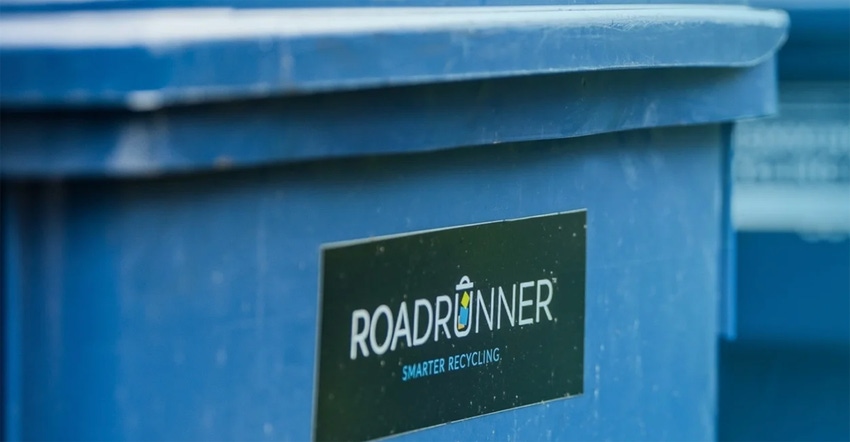To Combat Plastic Bag Bans, Consumer Education Is Key, Says RoadRunner Recycling
The sustainable waste-management company offers a template for improving recycling programs and diverting waste plastic from landfills, providing consumers with an alternative to outright bans.
May 16, 2022

New Jersey became the eighth state recently to enact a ban on single-use plastic bags, and more cities and states are working on similar legislation.
New Jersey Gov. Phil Murphy signed the bill to ban bags and other single-use plastic items in November 2020, and the law became effective on May 4. The New Jersey ban goes beyond plastics by also prohibiting single-use paper bags in all stores and food service businesses statewide.
|
Graham Rihn, CEO, RoadRunner Recycling. |
What can be done to stem the tide of plastic bag bans? It starts with education and using existing resources, according to Graham Rihn, CEO and founder of RoadRunner Recycling, a leader in end-to-end sustainable waste management for small and large businesses.
“By generating more education and encouraging active use of the recycling programs that exist within the grocery stores that utilize the bags, we could see a significant drop in the bags that are discarded or wrongly recycled in curbside bins,” said Rihn.
RoadRunner claims to recycle 99.9% of materials it collects
The Pittsburgh-based company’s RecycleMore program creates custom solutions for improving recycling practices and increasing landfill diversion. It said it recycles 99.9% of the materials it collects from its customers’ recycling containers. Roadrunner has more than 500 employees, operates in 20 cities, and has recycled more than 100,000 tons of material since the company was founded in 2014. Some of its customers include Avery Denison, Chick-fil-A, and The World Bank.
Most grocery stores will recycle plastic bags, and it doesn’t require much effort for consumers to return used bags to those stores for recycling. Getting people who don’t recycle plastic bags to change their behavior is difficult, but it’s a more likely solution than curbside recycling of plastic bags, according to Rihn.
“Education is the most important piece of any curbside recycling program,” he said. “The bags are not curbside recyclable because of their flimsy nature, so the community needs to understand that to recycle them properly something would need to be done to avoid them being tangled in the machine on the other end of the process. Just like cardboard boxes need to be broken down, or peanut butter jars need to be washed out before they go into the bin. If they are going to be recycled in the curbside bin, chances are it would be due to a community-based behavior change before the material goes in the bin.”
Plastics are problematic in the waste stream, so recycling is a better option.
“Plastic is a huge issue because of the time it takes to break down in a landfill and because of the low recycling rates of the material due to misinformation, contamination, or other factors,” Rihn said. “Only about 5% to 6% of plastics are recycled. Once plastic hits the landfill it can take decades for it to start to decompose. It’s a major problem.”
What companies can do
Companies need to take an active role in their sustainability efforts, according to Rihn.
Companies can start by choosing sustainable partners and packaging, he said. “If single-use plastic really [is needed] for packaging, try to find an option that is not made from virgin materials to minimize the amount of plastic entering our system. Often, business owners and leaders believe these options will be less cost-effective or expensive to deal with, but the price of producing plastic is often much higher than the green alternatives.
“Another great option would be to educate employees on the recycling efforts that have been put in place. Some of the biggest problems that companies have with their programs stem from misinformation and miscommunication. Clear signage and education are a great start for plastics recycling.”
States banning single-use plastic bags are not likely to see a universal outcome.
“The fate of the ban really depends on the community it’s in and how it is enacted,” Rihn said. “Some very green states have had plastic bag bans in place for years very successfully, others have had fees on their bags. If the community is open to utilizing new forms of bagging, like bringing their own tote or switching over to another material, it may be very successful.
“If there is pushback, it may be better to change a different aspect of the process, such as using bags made of compostable materials, reconsidering the recyclability of the bags, or re-educating the public about the bag recycling efforts offered by stores."
RoadRunner Recycling's value proposition
RoadRunner Recycling is different from municipal recycling programs and other private trash haulers/recyclers, explained Rihn.
“We look at recycling in a fundamentally different way. We don’t see recycling as a trash bin to be sorted out later. Each bin is separated by material, and some effort is expected by the user, but all for the greener good.
“RoadRunner also offers a FleetHaul service, where independent shipping trucks will pick up the containers, rather than your standard waste management service. This reduces the amount of gas and emissions because a hauling truck takes, on average, 12 miles per gallon whereas a waste truck takes 3 to 4.
“Because our customers do some of the work on the front end, we save them money, and the recyclables can skip the sorting process and go straight to the end of the line for bundling and purchase. Our recyclables are cleaner and more likely to be reused."
About the Author(s)
You May Also Like





